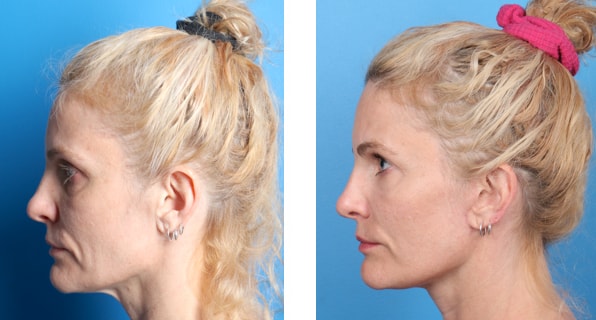With so much information out there about facelifts and facelift alternatives, separating fact from fiction can be difficult. To help you find the accurate answers you’re looking for, here are the answers to some of the most frequently asked questions about getting a facelift, from how to tell if a facelift could be right for you to the best way to achieve long-lasting results.
Contents
Can facial exercises work as well as a facelift?
There has been talk lately that performing various facial exercises can “tone” and “tighten” your face, much like your workouts at the gym can tone and tighten your abs or biceps. Unfortunately, the two concepts are not one in the same.
Signs of skin aging like lines, wrinkles and sagging skin can actually be made worse by repetitive facial movements, and no amount of facial exercise is going to be able to get rid of these common signs of aging. If these are your main cosmetic concerns, a facelift or other nonsurgical alternatives like injectable wrinkle treatments are most likely going to be your best options.
How do I know if it’s the right time for a facelift?
So if facial exercises aren’t going to do the trick, how do you decide if it might be time to commit to a facelift? If your self-confidence is affected by the appearance of sagging skin or deep lines and creases, or if nonsurgical treatments don’t seem to be cutting it anymore, a facelift may be the most effective solution.
There also isn’t an age cutoff for getting a facelift. As long as you are in general good health, just about anyone at any age could be a good candidate for this procedure. You know it’s time for a facelift is when you hate the look of your neck and your jawline. There is nothing short of a facelift that corrects the loose skin and neck muscles and extra fat under the chin like a well-performed facelift done by an experienced expert.
What’s recovery like?
For the first few days after your facelift, plan on taking it easy and having someone else around to help you. The general recovery period is usually about 10 days, and stitches are usually removed after the first week. Most people feel comfortable returning to work and other normal activities around the two-week mark.
To help speed up your recovery process, make sure you’re eating healthy, nourishing foods, are getting plenty of rest and are following your plastic surgeon’s specific recovery guidelines.
How long will facelift results last?
Although no plastic surgeon can guarantee the precise length your results will last, the effects of most facelifts typically last for years before a touch-up might be needed. To prolong your results even further, try to stay out of the sun, wear sunscreen, eat a healthy diet and talk to a skincare professional about which products are right for your skin.








